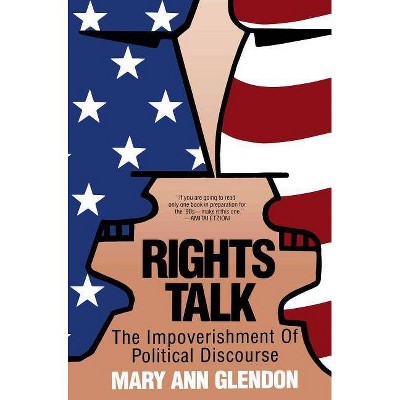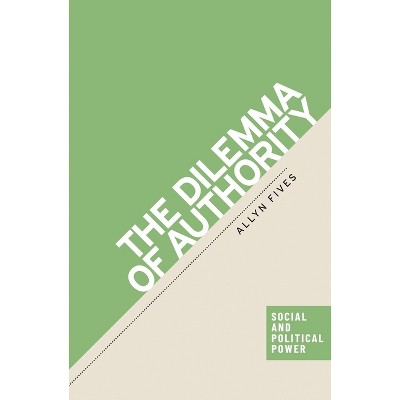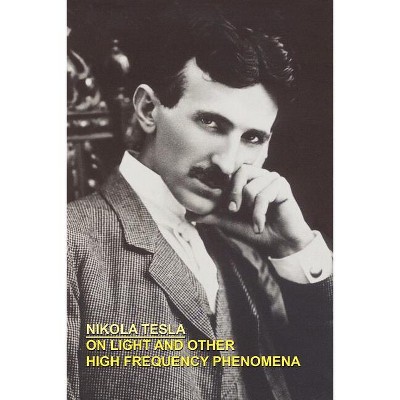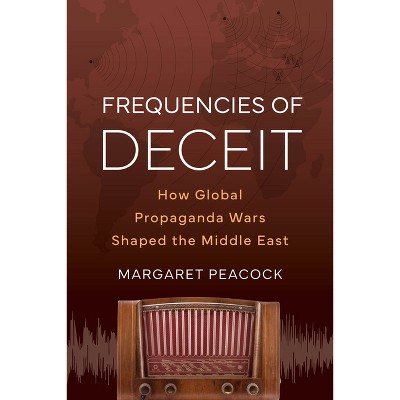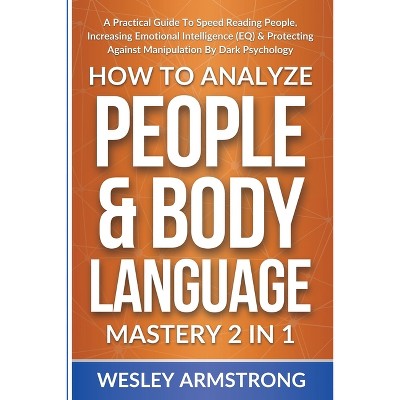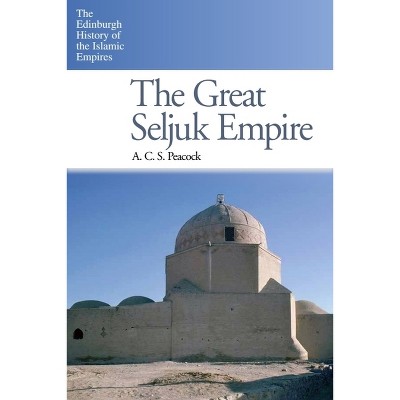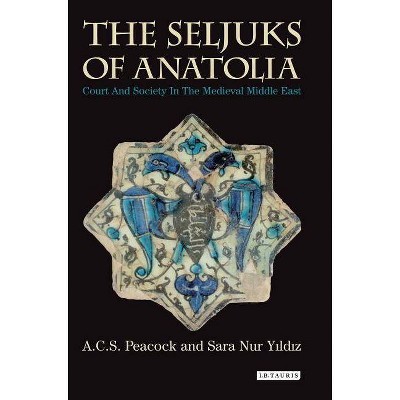Sponsored

Frequencies of Deceit - by Margaret Elizabeth Peacock
$29.95
In Stock
Eligible for registries and wish lists
Sponsored
About this item
Highlights
- On June 8, 1967, Egypt's most famous radio broadcaster, Ahmed Said, reported that Egyptian, Syrian, and Jordanian forces had defeated the Israeli army in the Sinai, had hobbled their British and US allies, and were liberating Palestine.
- About the Author: Margaret Peacock is Professor of History at the University of Alabama.
- 326 Pages
- History, Middle East
Description
About the Book
"On June 8, 1967, Egypt's most famous radio broadcaster, Ahmed Said, reported that Egyptian, Syrian, and Jordanian forces had defeated the Israeli army in the Sinai, had hobbled their British and US allies, and were liberating Palestine. It was a lie. For the rest of his life, populations in the Middle East vilified Said for his duplicity. However, the truth was that, by 1967, all the world's major broadcasters to the Middle East were dissimulating on the air. For two decades, British, Soviet, American, and Egyptian radio voices created an audio world that was characterized by deceit and betrayal. In this important and timely book, Margaret Peacock traces the history of deception and propaganda in Middle Eastern international radio. Peacock makes the compelling argument that this betrayal contributed to the loss of faith in Western and secular state-led political solutions for many in the Arab world, laying the groundwork for the rise of political Islam"--Book Synopsis
On June 8, 1967, Egypt's most famous radio broadcaster, Ahmed Said, reported that Egyptian, Syrian, and Jordanian forces had defeated the Israeli army in the Sinai, had hobbled their British and US allies, and were liberating Palestine. It was a lie. For the rest of his life, populations in the Middle East vilified Said for his duplicity. However, the truth was that, by 1967, all the world's major broadcasters to the Middle East were dissimulating on the air. For two decades, British, Soviet, American, and Egyptian radio voices created an audio world characterized by deceit and betrayal. In this important and timely book, Margaret Peacock traces the history of deception and propaganda in Middle Eastern international radio. Peacock makes the compelling argument that this betrayal contributed to the loss of faith in Western and secular state-led political solutions for many in the Arab world, laying the groundwork for the rise of political Islam.From the Back Cover
"This book is international history of the finest quality. It goes beyond the Cold War battle for hearts and minds to say something important about how words and images can reveal or set the contours of a political landscape."--Tony Shaw, coauthor of Hollywood and Israel: A History "Margaret Peacock nimbly shows how Arabic-language radio stations worked in a kind of competitive dialogue in an effort to secure international Arab citizens' loyalty during the Cold War. But the rhetorical world they created became brittle and increasingly disconnected from people's lived experience, finally shattering after the broadcasts falsely claimed victory during the disastrous defeat of the 1967 war."--Andrea L. Stanton, author of This Is Jerusalem Calling: State Radio in Mandate Palestine "Fascinating, important, and timely. Peacock has produced a superb history of the psychological warfare and radio battles that defined--and distorted--the modern Middle East."--James Vaughan, Lecturer in International History, Aberystwyth University "In this dazzling book, Peacock deftly charts the Cold War of international radio propaganda for the hearts and minds of people living in Middle East. She weaves evidence from US, Soviet, British, and Arab sources to map the interplay of lies, selective truths, exaggerations, and wishful thinking that eddied around Arab listeners. Her remarkable study serves as a lesson for our own media-buffeted era, pointing to the price of broken illusions: a stage set for a new generation of extreme propaganda, in this case religious. This is a worthy successor to her excellent study of children in Soviet and American Cold War propaganda and establishes Peacock as a major figure in the field of propaganda history."--Nicholas J. Cull, author of The Cold War and the United States Information Agency: American Propaganda and Public Diplomacy, 1945-1989Review Quotes
"This is not just a book about the Middle East. It is a deep investigation into how truths are created, distributed, and erased. Margaret Peacock compels the reader to reconsider the sources of their information, to look beyond what was said and into how -- and why -- it was transmitted, or how much of what we think we know is fact and how much is just signal?"
-- "Pianeta Libri news""Exceptionally well written, impressively informative, and thoroughly 'reader friendly' in organization and presentation. A substantial and original work of meticulous and detailed scholarship."-- "Midwest Book Review"
About the Author
Margaret Peacock is Professor of History at the University of Alabama. She is author of Innocent Weapons: The Soviet and American Politics of Childhood in the Cold War and coauthor of A Deeper Sickness: Journal of America in the Pandemic Year.Dimensions (Overall): 8.9 Inches (H) x 5.9 Inches (W) x .9 Inches (D)
Weight: .95 Pounds
Suggested Age: 22 Years and Up
Number of Pages: 326
Genre: History
Sub-Genre: Middle East
Publisher: University of California Press
Format: Paperback
Author: Margaret Elizabeth Peacock
Language: English
Street Date: February 25, 2025
TCIN: 93441115
UPC: 9780520409743
Item Number (DPCI): 247-48-7582
Origin: Made in the USA or Imported
If the item details aren’t accurate or complete, we want to know about it.
Shipping details
Estimated ship dimensions: 0.9 inches length x 5.9 inches width x 8.9 inches height
Estimated ship weight: 0.95 pounds
We regret that this item cannot be shipped to PO Boxes.
This item cannot be shipped to the following locations: American Samoa (see also separate entry under AS), Guam (see also separate entry under GU), Northern Mariana Islands, Puerto Rico (see also separate entry under PR), United States Minor Outlying Islands, Virgin Islands, U.S., APO/FPO
Return details
This item can be returned to any Target store or Target.com.
This item must be returned within 90 days of the date it was purchased in store, shipped, delivered by a Shipt shopper, or made ready for pickup.
See the return policy for complete information.
Frequently bought together

$21.39
MSRP $32.99
Buy 2, get 1 free select books, music & movies
4.2 out of 5 stars with 595 ratings

$18.88
MSRP $27.00
Buy 2, get 1 free select books, music & movies
4.8 out of 5 stars with 571 ratings

$17.76
MSRP $29.99
Buy 2, get 1 free select books, music & movies
4.4 out of 5 stars with 111 ratings
Guests also viewed

$4.34
MSRP $7.99
Buy 2, get 1 free select books, music & movies
4.9 out of 5 stars with 115 ratings
